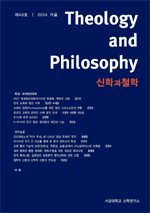철학적 신론과 신학적 신론의 연속성 - 『신학대전』제1부의 신론에 대한 하나의 고찰: ‘이성의 인식행위’에 주목하여
The Continuity Between Philosophical and Theological Discourses on God : A Study on the Theory on God in the First Part of Summa Theologiae, with a Focus on the ‘Act of Reason’
- 서강대학교 신학연구소
- 신학과철학
- 제48호
-
2024.12325 - 358 (34 pages)
-
DOI : 10.16936/theoph..48.202412.325
- 14

토마스 아퀴나스의『신학대전』제1부 신론은 ‘일체-신(Deus unus)’에 대한 논고와 ‘삼위-신(Deus trinus)’에 대한 논고로 나뉜다. 이 구별로 인해 토마스 신론의 이해에 있어‘일체-신’론에 비해 ‘삼위-신’론이 덜 중요하게 여겨진다고 잘못 해석되거나, 또는 ‘삼위- 신’론의 신앙 의존성이 과도하게 해석될 위험에 노출될 수 있다. 그러나 토마스의『신학대전』이 근본적으로 ‘신학’임을 부인하지 않고 또한 ‘삼위-신’에 대해서는 ‘신앙’에 의해서만 알려질 수 있는 내용이 포함된다는 것도 부인할 수는 없지만, 그것이 이성을 통해서 정당화될 수 없고 정당화되어서도 안 된다는 주장으로 이해되는 것은 적절하지 않다. 이 연구에서는 ‘신조에 앞서는 것’ 뿐만 아니라, 신조에서도 이성적 논증이 필수적 역할을 한다는 사실을,『신학대전』의, ‘일체-신’뿐 아니라 ‘삼위-신’을 포함한 ‘신’론 전체의고찰방식 및 순서(질서)가 토마스가 이해하는 ‘인간 이성의 고찰방식에 부합되는 것임을보여줌으로써 확인할 것이다. 이점이 확인되고 나면, ‘발원과 귀환(exitus-reditus)’의 구도로『신학대전』을 해석할 때, 비록『신학대전』제2부가 의지의 측면에서 귀환(reditus)이라는 점에는 대부분의 연구가 동의하면서도, 지금까지 주목하지 않은 점, 즉『신학대전』의신론이 인간 이성의 측면에서 이미 reditus로 볼 수 있다는 해석을 제안할 수 있을 것이다.
In his Summa Theologiae, Thomas Aquinas’s teachings on God are organized into two primary treatises: one concerning Deus unus and the other concerning Deus trinus. This structural division has often led to interpretative challenges, with some either diminishing the significance of the treatise on Deus trinus in comparison to Deus unus, or positing that the entirety of Aquinas’s doctrine on God cannot be justified by rational argumentation. While this article does not dispute that the Summa Theologiae is fundamentally a ‘sacred doctrine’, which necessarily includes truths inaccessible to reason, it nevertheless argues that it is a misinterpretation to claim that the treatise on Deus trinus is beyond the reach of rational inquiry. By demonstrating that the method and procedure by which the treatises on God - including the teachings on Deus trinus - are presented correspond with the method and procedeure of human reasoning, this article asserts that reason plays an indispensable role not only in the praeambula fidei but also in the articuli fidei. Finally, the article introduces an interpretative perspective that has been largely overlooked: namely, that the treatise on God may be understood as the reditus of the intellect, while the secunda pars of the Summa Theologiae may be interpreted as the reditus of the will, in accordance with the exitus-reditus schema.
들어가는 말
1. 인간의 자연 이성에 의한 신-인식의 가능성과 양태
2. ‘일체-신’에 대한 이성적 고찰로서 철학적 신론
3. 신학적 신론에 의해 인도된 철학적 신론을 통한 신학적 신론의 전개
4. 맺음말: 이성의 관점에서 귀환(reditus)으로서의 신론
(0)
(0)